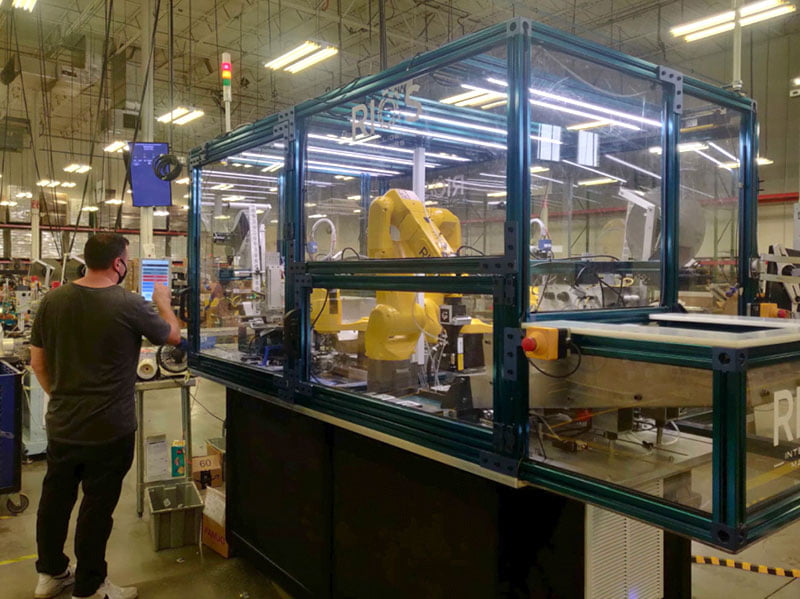CSIRO’s innovation fund Main Sequence Ventures has led a $39 million investment into RIOS Intelligent Machines which will see the US-based AI factory robots firm come to Australian shores.
The investment will help the company establish operations in Australia and increase the scale of its robotic fleet for existing customers and to reach new ones. The firm has now raised a total of US$33 million.

RIOS founder and chief executive officer Dr Bernard Casse said the firm’s Australian subsidiary will first focus on establishing an applied research and development centre. It will also work with local contract manufacturers and will hire staff for the fabrication, assembly, and testing of workcells.
“We’re first establishing an Applied R&D centre to strategically tap into Australia’s ecosystem of research institutions industry experts to develop innovative technologies that would allow us to scale faster. In addition, the Australia market is fertile ground, and we’d like to get early access and own this market,” Dr Casse said.
Currently the robotic arms are manufactured in Japan by robot manufacturer FANUC while workcell components are built in the US by contract manufacturers.
As part of the funding round, Main Sequence partner Mike Zimmerman will sit on the RIOS board of directors with Yamaha Motor Ventures chief operating officer and managing director Anish Patel also joining as a board observer.
The oversubscribed series A round found new investors in Main Sequence, Yamaha Motor Ventures, Orbit Venture Partners, Hypertherm Ventures, as well as support from existing investors Morpheus Ventures, Grit Ventures and Valley Capital Partners, among others.
Mr Zimmerman said that the Main Sequence investment is well aligned with the federal government’s Modern Manufacturing Strategy (MMS), which aims to boost the competitiveness of local manufacturing, particularly for deploying RIOS robots to the food and beverage sector, which is one of Australia’s national manufacturing priorities under the strategy.
“Customers we spoke to said things like ‘no brainer’ and ‘we will buy these as fast as they can roll them out’,” Mr Zimmerman said.
“RIOS’s combination of RaaS business model and adaptable end-to-end robotic workcell platform is the ideal answer to the labour and supply chain challenges facing manufacturers around the globe. Having looked at a wide range of robotics technologies and services, Main Sequence was attracted to RIOS’ strong market traction, positive customer feedback, and world-class team.
“We’re also thrilled that RIOS is strategically tapping into Australia’s ecosystem of industry experts, research institutions, and commercial companies to both commercialise innovative robotic technologies and get early access to the Australian market.”
The Silicon Valley firm was founded in 2018 by former engineers of tech innovation company Xerox PARC. The company’s AI robotic workcells can be used to automate the work of two people in factory assembly lines, warehouses, or supply chain operations.
The modular workcells use computer vision and grippers for packaging, quality control, and assembling. RIOS runs a robots-as-a-service business model which means firms pay per hour of use.
Dr Casse said the solutions his firm offers could be integrated into existing workflows at no additional capital expenditure to businesses.
“Bedrock sectors of our global economy are crippled by a labour shortage problem that Covid turned into a full-blown crisis. Today, most factories in the world are labour-intensive, and with millions of jobs unfilled, manufacturers are unable to keep up with skyrocketing consumer demand – and they are in extreme pain,” Dr Casse said.
“We have the cure to this trillion-dollar opportunity. We’re re-industrialising these industries with best-in-class technology while upskilling our workforce in the process and enabling them to access higher-level and better-paying jobs.”
Main Sequence’s investment comes out of their $250 million investment fund, founded at the end of April last year, and as a part of the Supercharge industrial Productivity challenge led by Mr Zimmerman. This follows the successful investment in 26 deep tech companies through the first fund, which began in 2017.
The MMS was announced in 2020 as a COVID-19 recovery scheme, but it was revealed last week that only $85 million of the $1.5 billion set aside has been released so far.
Editor’s note: This article has been updated to include additional comment from RIOS founder and chief executive officer Dr Bernard Casse
Do you know more? Contact James Riley via Email.

